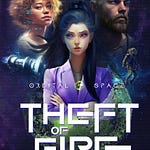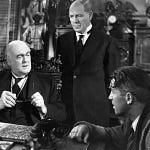And he shall turn the heart of the fathers to the children, and the heart of the children to their fathers, lest I come and smite the earth with a curse.
Malachi 4:6
For the last five months, Greg Treat has run our weekly Great Houses call, in which he has laid out a detailed legal, financial, and interpersonal framework for building a great house — a cohesive, influential family that persists beyond the life of the founding patriarch.
In the episode, Greg discusses how this is to be done. The podcast series (available for members) goes into significantly deeper detail on specific financial instruments, business and charitable entities, and contractual relationships that can make a Great House legally enforceable.
Below, I’ll explain why we are pursuing this.
Everything we do at EXIT is aimed at the restoration of the family as the fundamental social and political unit.
The family — particularly, the reciprocal love and obligation between father and son — is the primal emotional circuit of loyalty, sacrifice, and obedience that allows men (especially men of unequal status) to organize and cooperate on grounds that are neither transactional nor coercive.
Every bond between social unequals makes use of this instinct at some level of abstraction: a relationship of duty to an inferior is patronage, a responsible class is patrician, a king is pater patriae, a general is a “father to his men”, a nation is bound by birth to a common fatherland, and owes that nation a debt of patriotism.
Patriarchy is the instinct that allows men to organize & obey intelligently, rather than crudely following incentives — & leaders that capture this instinct effortlessly overpower armies of slaves & mercenaries.
But as technology enables greater social scale, this “us-ness” has to be stretched thin over an ever-larger and more heterogeneous population, from clans to tribes to nations — culminating in a global “civic nation” whose members have nothing meaningful in common. So the filial instinct is diluted and abstracted to nothing, like homeopathic medicine.
In a global “civic nation”, the fictive “family” of the state has no outside enemies, so it must turn inward to justify its existence.
Instead of defending “us” versus “them”, the global state exists to insinuate itself between the weak and the strong — relentlessly searching for conflicts between unequals that it can stamp out.
But inequality and conflict are inescapable characteristics of every human connection — so, of necessity, the state has made itself the enemy of human connection as such.
On a recent podcast, Curtis Yarvin contrasted the social role of a chauffeur to that of an Uber driver: the relationship between a chauffeur and his wealthy employer is obviously hierarchical and unequal — a “power dynamic” exists which is not present with an Uber driver, with whom the rider may not even exchange words.
A wealthy employer can abuse and exploit a household servant in a personal way that is not possible with a gig worker — but it’s precisely the intimacy of the relationship that creates the capacity for betrayal. So a potentially dangerous human relationship gives way to a safe (and sterile) transaction.
As Yarvin notes, even the communists admit that something important has been lost here, even if they can’t articulate exactly how or why.
And this is the mission of the global state in every human relationship:
Find examples of the stronger party behaving badly (these are always abundant)
Debase the values or standards that generate the hierarchy, to the benefit of the weaker party
Imply that the hierarchy — and thus the relationship itself — is inherently (or “structurally” or “systemically”) abusive
Abolish the relationship and replace it with a transaction, mediated by the state
This is why “globalism” is a synonym for “gay race communism”.
A global state can only exist to eradicate interpersonal hierarchies — and the only way to eradicate interpersonal hierarchies is to eradicate all human values, all human judgment, and all human relationships. It’s the egalitarianism of a Soviet orphanage — or a mass grave.
This process is already complete for nations, traditionally defined: citizenship is a straightforward matter of paperwork and fees.
Social, civic, and professional institutions face immense pressure under the postwar civil rights regime to make their requirements algorithmic, credentialist, and impersonal. Most of these institutions, having their lifeblood drained, simply wither away — the only social role left to most people at scale is a nakedly transactional job.
Marriage is no longer a binding covenant, and the state pumps enormous energy into breaking the instinctively hierarchical character of marriage. But both men and women find egalitarian, transactional “marriage” so viscerally repulsive in practice that the vestigial legal institution is simply dying.
What is left in the wreckage of all these human connections is homo economicus, resentfully doing exactly what he is paid to do: slaves and mercenaries and machines.
The last genuinely human relationship is the one from which all politics is derived: the relationship between parent and child.
The state already insinuates itself deeply in this relationship via CPS, schools, media — but most importantly indirectly, by making children a wedge in marital conflicts.
The trans phenomenon is best understood through this lens: what looks like a series of custody battles between various mothers and fathers is, in fact, a custody battle between the state and the citizens.
Now, there are almost no bonds left to break, nothing left to consume with enough energy to sustain the global machine.
No one inside this system is breeding, or enlisting to fight its wars, or investing in its future, and competing power structures are springing up like tumors throughout these societies (most of them foreign and hostile to us.)
What we need now are “strong families”, in a very specific sense.
We have to rebuild the illegible-but-binding ties of love and loyalty that once existed within (and, critically, between) families: first and foremost because it’s a far happier and more natural way to live, but also because we will need such ties to survive the decay of the global state, and to build for what replaces it.
This doesn’t just mean loving our kids a lot (though it at least means that): it means rebuilding the family as the source of your children’s livelihood and the wellspring of their social identity.
The modern home is an institution of consumption.
Your real life — the domain of your triumphs and failures, in which you create and contribute — unfolds at work or school, among separate groups of strangers, under the eye of the state.
You spend time with your kids for an hour or two before bedtime, once “real life” is over. And of course, you are not at your most impressive while decompressing and consuming — so it’s unsurprising that young people do not find their parents’ lives compelling, and don’t want to grow up to be like them.
And once your children “go off to college”, your lives no longer intersect in any practical sense, so you connect as you did when they were growing up — on holidays, as a reprieve from your real life.
(This is almost certainly why young people tend to view marriage and family as a capstone achievement, a thing to do when their careers are established in their mid-thirties. In their minds, a family is fundamentally an expensive hobby.)
But a Great House is an engine of human cultivation.
A Great House repatriates the economic life of the family: the patriarch of a Great House reclaims the responsibility to educate his children, provide them with a living, and find them admirable partners with whom to build family of their own.
To be successful, a Great House has to provide a parallel institution of status, which means that it must unite with other families to cultivate and deploy elite talent which competes credibly with the best the global state has to offer. (As traditional talent pipelines degrade, this is an increasing achievable goal.)
To make this happen, a lot of high-capacity guys have got to pool capital, build businesses, develop social and civic influence, and deliberately prepare (and indoctrinate) their children to go to work for the Family.
They have to become personally aspirational — to draw their wives and children and friends into what they are creating — because, at present, the attraction of truth and beauty is all we have.
In other words, we have to restart human civilization from its psychospiritual bedrock. It’s a tall order — but our enemies are at war with God and nature, and we are in league with the stones of the field.
EXIT News
Tuesday night full group calls
This week (9/30), we discussed Orienting ourselves in times of volatility. How do we avoid being hypnotized by spectacle, seize the initiative, and continue to build during chaotic times? Call was not recorded.
On 10/7, we will have a member Q&A with Josh Lisec, co-author (with Jack Posobiec) of Unhumans: The Secret History of Communist Revolutions.
Meetups
10/10: Nashville.
10/17-10/18: Canyoneering trip in Zion National Park. Contact Devin or check #utah channel for details.
10/25: Oklahoma City.
11/8: Old Glory Club’s Weaving Event in Portland. I will be speaking.
Cocktail hour invites for Nashville (9/27) and Oklahoma City (10/25) available to subscribers here. EXIT cocktail hours are a great way to get to know the guys in your local area and figure out if the group is right for you.











